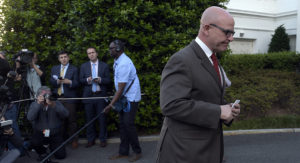Thomas E. Ricks has written one of the more astonishing political columns I’ve seen in a good while.
The Pulitzer Prize winner, writing in Politico, says that national security adviser H.R. McMaster should resign his post to salvage his stellar reputation as a military thinker and strategist.
McMaster is on active duty in the U.S. Army. He’s a lieutenant general known for his intellect, integrity and courage. He wrote a book, “Dereliction of Duty,” that provides a scathing critique of how the chain of command prosecuted the Vietnam War.
Here is a snippet from Ricks’ essay in Politico: “McMaster probably thinks that by staying at his post, rather than resigning in disgust, he is doing his duty. Specifically, he may think that if stepped down, he might well be succeeded by an alt-right ally of White House adviser Steve Bannon. As I said, I used to believe that too.
“But I have watched and waited, and I don’t see McMaster improving Trump. Rather, what I have seen so far is Trump degrading McMaster. In fact, nothing seems to change Trump. He continues to stumble through his foreign policy—embracing autocrats, alienating allies and embarrassing Americans who understand that NATO has helped keep peace in Europe for more than 65 years.”
Ricks’ concern about an Army officer he has known for 20 years is that he now works for someone who knows nothing about government and seems to have no interest in learning the ins and outs of governing the greatest nation on Earth.
Yet the general has to provide political cover for a president who, in Ricks’ view, doesn’t deserve to hold the office he now occupies.
As Ricks writes: “The saving grace of Donald Trump as president is his incompetence. He knows almost nothing of how the federal government works. He seems to have been repeatedly surprised by the checks and balances written into the Constitution by the Founding Fathers. And he seems uninterested in learning.”
Ricks’ essay is a beaut. I am quite sure that Gen. McMaster has read it. Whether he takes it to heart — and acts on it — of course only he can answer.


